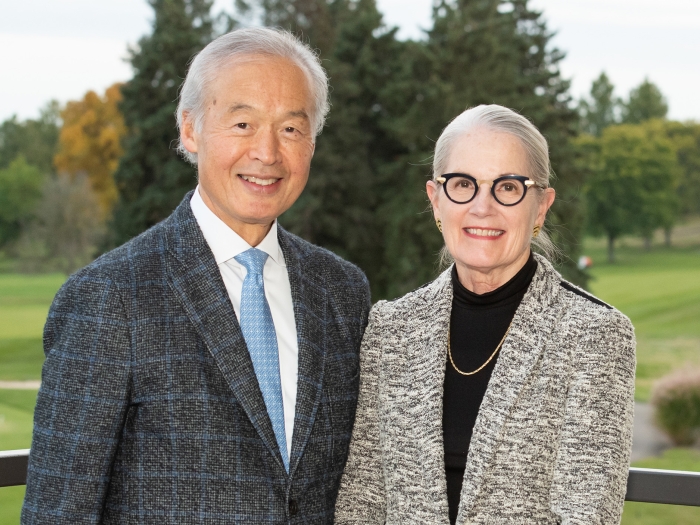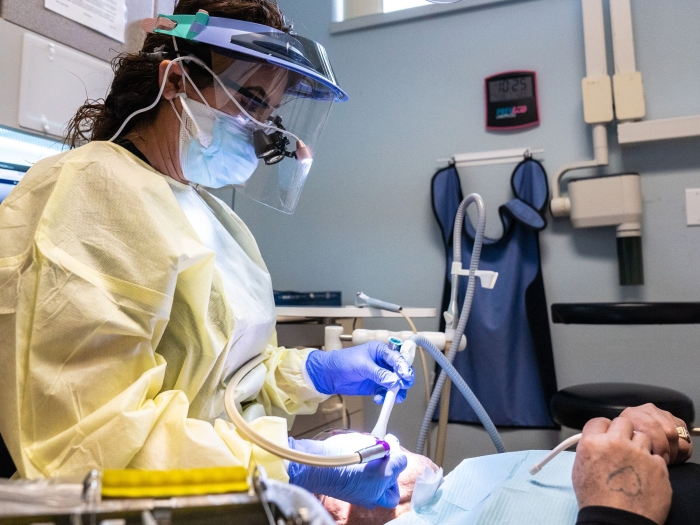
Regent Ron Weiser and his wife, Eileen, have committed $30 million to the University of Michigan for diabetes research and the development of life-changing diabetes therapies at Michigan Medicine, in collaboration with other U-M schools and units.
The gift — named for Weiser's daughter, who has two sons and a husband with Type 1 diabetes — will establish the Elizabeth Weiser Caswell Diabetes Institute. The U-M Board of Regents approved the naming in June.
The institute will advance U-M faculty-led collaborative projects that have the potential for rapid clinical application.
"This is one of the most important things that has happened for diabetes research, not just for the University of Michigan, but for the whole country."—Martin Myers Jr., M.D., Ph.D., director of the Elizabeth Weiser Caswell Diabetes Institute
"Elizabeth has been a relentless educator and advocate for people with diabetes and for diabetes research," Ron Weiser says. "Our family hopes that the collaboration among physicians, researchers, innovators, and advocates across campus will allow the work she's done — and continues to do — to be rewarded with cures for diabetes."
Caswell has served on behalf of the diabetes nonprofit JDRF and will be a member of the fiscal year 2021 JDRF International Board of Directors and vice chair of the JDRF Research Committee.
The Elizabeth Weiser Caswell Diabetes Institute will centralize and coordinate campus resources — anchored by a group of more than 250 world-renowned, dynamic researchers in diabetes, diabetic complications, obesity, and metabolism — and allow U-M to bring new depth and discovery to the quest for answers to diabetes.
"This is one of the most important things that has happened for diabetes research, not just for the University of Michigan, but for the whole country," says Martin Myers Jr., M.D., Ph.D., director of the new institute, Marilyn H. Vincent Professor of Diabetes Research, and professor of internal medicine, and of molecular and integrative physiology in the Medical School.
"The institute is built on the idea that we can't only study one aspect of diabetes, but rather that we need to work together to attack every piece of this disease at the same time. Thus, we will simultaneously work toward making designer insulin-producing beta cells as a therapy for diabetes, seek to understand how to block the onset of Type 1 and Type 2 diabetes, and focus on how to improve clinical care and access to current lifesaving therapies."
To ensure that a new generation of researchers are trained to continue investigations that mitigate the impact of Type 1 diabetes, Elizabeth Weiser Caswell and her husband, Trey, partnered with the Weisers to establish the Caswell Family Fellowship in pediatric endocrinology, part of the $30 million commitment.
"The Weiser family has a long history of championing the work of faculty and teams at the University of Michigan through their generosity and proliferation of vital partnerships," says U-M President Mark Schlissel, M.D., Ph.D.
"This gift will ensure that U-M is able to translate scientific discoveries into treatments for diabetes that save lives in our community and beyond. I am personally touched by the way this family has translated their personal experience with diabetes into hope for all people, and grateful for their confidence in U-M's promise to make a difference."
Ron and Eileen Weiser are longstanding U-M alumni, volunteers, and donors, committing more than $100 million to the university to date. In addition to Ron Weiser's service on the Board of Regents, they both served as vice chairs of the Victors for Michigan campaign and support a wide range of programs across all three campuses.
The Elizabeth Weiser Caswell Diabetes Institute will build on best practices of the standout programs developed at U-M and other top institutions.
As part of the top public university in research spending in the United States, and in partnership with 20 divisions and departments within Michigan Medicine and 14 schools and units across the U-M campus that focus on diabetes care and research, the institute will strengthen U-M's leadership nationally and globally in this space.
Several national and international collaborators will work with the U-M and Michigan Medicine teams.
"This gift is transformational," says Marschall S. Runge, M.D., Ph.D., executive vice president for medical affairs, dean of the Medical School, and CEO of Michigan Medicine. "We are immensely grateful to the Weisers for opening the doors that enable our physicians and researchers to push the boundaries that will transition cutting-edge discoveries in diabetes investigations into lifesaving therapies for children and adults."
Michigan Medicine is known for excellence in research and care for those with diabetes and the complications that it causes.
"Diabetes is so hard. You don't want to think about complications, but you know they're out there," Elizabeth Caswell says.
"Diabetes doesn't allow anybody to shut down and forget about it; there's no break. Fortunately, the team at Michigan Medicine has been there for us every step of the way — advising us on daily care, advances in treatment technologies, and opportunities for clinical research. Until T1D is cured, we are grateful for top-notch care at one of the best research institutions in the world."





